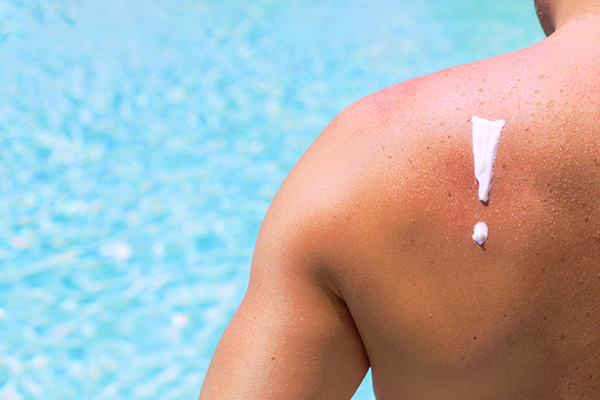
In the sweltering heat of summer or during periods of intense physical activity, many of us have experienced the discomfort of heat rash symptoms. This common skin condition, also known as prickly heat or miliaria, can put a damper on our outdoor adventures and leave us itching and irritated.
Understanding the symptoms and treatment options for heat rash is crucial to managing this condition and ensuring our skin stays healthy. Additionally, it’s essential to know when it’s time to seek treatment from a medical professional should your symptoms not subside on their own.
What Causes Heat Rash?
Heat rash typically occurs in hot and humid environments when the body produces excessive sweat to cool itself down. The excess sweat can overwhelm the sweat ducts, causing them to become clogged or obstructed. The trapped sweat, along with bacteria and dead skin cells, leads to the characteristic symptoms of heat rash.
The primary cause of heat rash is the combination of high temperatures and humidity, inhibiting proper sweat evaporation. However, heat rash can also develop in individuals who engage in intense physical activity or wear tight clothing that restricts airflow to the skin.
Heat Rash Symptoms
Heat rash manifests through a range of symptoms that can vary in intensity and presentation. Recognizing these symptoms is essential for timely identification and appropriate management of heat rash. Here, we will outline the common symptoms associated with this condition:
- Redness and rash: The primary symptom of heat rash is the appearance of a red rash on the affected area of the skin. The rash may be small, localized bumps or larger patches, depending on the severity of the condition.
- Itching and irritation: Heat rash often causes intense itching, which can exacerbate the discomfort experienced. The affected area may feel prickly, stinging, or generally irritated. The urge to scratch the rash should be avoided, as it can lead to further inflammation and potential infection.
- Prickling or tingling sensation: Many individuals with heat rash report a prickling or tingling sensation on the affected skin. This sensation may be particularly noticeable during moments of increased perspiration or when exposed to heat.
- Small blisters or pustules: In certain types of heat rash, such as miliaria rubra or miliaria pustulosa, small blisters or pustules may form. These may contain clear fluid or pus and can add to the discomfort and appearance of the rash.
- Increased discomfort in hot conditions: Symptoms often worsen in hot and humid environments or during activities that induce excessive sweating. The combination of heat and moisture can further irritate the skin and intensify itching and redness.
It's important to note that the severity of symptoms can vary from person to person. In some cases, heat rash may be mild and resolve on its own within a few days. However, in more severe cases or when symptoms persist or worsen, it is advisable to seek medical attention for proper diagnosis and treatment.
Heat Rash Treatment
When it comes to treating heat rash, the primary goal is to alleviate symptoms, reduce inflammation, and promote healing of the affected skin. Treatment options range from simple self-care measures to medical interventions, depending on the severity of the rash. Here are some common treatment options for heat rash:
Self-Care Measures
- Use cool compresses: Applying cool, damp compresses to the affected area can help soothe the skin, reduce itching, and provide relief.
- Avoid tight clothing: Wearing loose-fitting, breathable clothing can promote airflow and prevent further irritation to the skin.
- Try over-the-counter (OTC) remedies: Topical treatments such as calamine lotion or hydrocortisone creams can provide temporary relief from itching and inflammation.
Medical Interventions
- Prescription creams or ointments: In cases of severe or persistent heat rash, a healthcare professional may prescribe topical medications containing corticosteroids or antibiotics to reduce inflammation and prevent infection.
- Oral medications: In rare instances when heat rash is severe or associated with complications, oral medications such as antihistamines or antibiotics may be prescribed to address symptoms and treat underlying issues.
Heat Rash Prevention
Preventing heat rash is crucial in avoiding the discomfort and inconvenience associated with this skin condition. By implementing a few preventive measures, you can reduce the likelihood of developing heat rash.
- Stay cool and hydrated: Seek shade or cool indoor areas during hot and humid weather, and drink lots of water to stay hydrated.
- Wear appropriate clothing: Wear loose-fitting, lightweight, and breathable clothing made from natural fibers like cotton.
- Avoid excessive sweating: Limit physical activity during peak heat hours.
- Use air conditioning and fans: Use air conditioning or fans to maintain a cool and well-ventilated environment.
- Regularly care for skin: Keep your skin clean and dry to prevent sweat buildup and blockage of sweat ducts.
- Acclimate gradually: If traveling to a hot and humid climate, allow your body time to adjust gradually to the new environment.
By following these preventive measures, you can minimize the risk of heat rash occurring.
When to See a Doctor
While heat rash is generally a mild and self-limiting condition, complications can arise in certain cases. If home remedies and self-care measures do not improve the symptoms or if the condition worsens, consulting a healthcare provider is advisable.
Our medical professionals at American Family Care (AFC) can provide a comprehensive evaluation, diagnose any underlying conditions, and recommend appropriate treatment options. Depending on the patient, our medical staff may prescribe medicated creams, ointments, or oral medications to alleviate symptoms, reduce inflammation, and prevent complications.
Are you in need of treatment for heat rash? Head to an AFC location today to receive prompt and affordable urgent medical care services.


